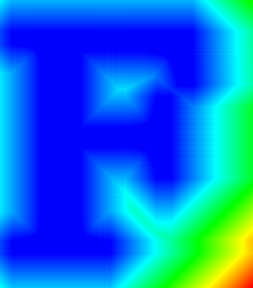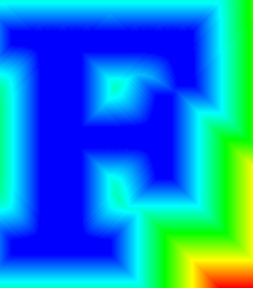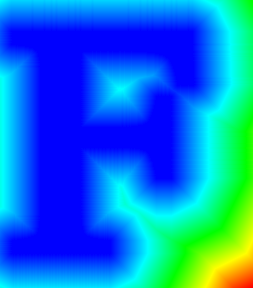Chamfer Distance Transform
Include <mln/labeling/chamfer_distance_transform.hpp>
-
template<typename DistanceType = int, Image I, WeightedNeighborhood N>
image_ch_value_t<InputImage, DistanceType> chamfer_distance_transform(I input, N nbh, bool background_is_object = false) Perform the distance transform [1] using the given Neighborhood and its weights. Each foreground pixel gets the distance to the closest background pixel.
Note that the sum saturates to the maximum value that can be taken by DistanceType.
- Template Parameters:
DistanceType – The type used for the accumulation
- Parameters:
input – Input image
nbh – Neighborhood (weighted)
background_is_object (optional) – Whether to consider the domain “outside” is the foreground (object) or the background.
- Returns:
A distance image
- Exception:
N/A
Notes
Complexity
Linear in pixels (2 passes).
Example
Example with the chessboard distance:
#include <mln/labeling/chamfer_distance_transform.hpp>
#include <mln/core/neighborhood/c8.hpp>
auto out = mln::labeling::chamfer_distance_transform<int16_t>(input, mln::c8, true);
Example with the 5-7-11 weights:
#include <mln/labeling/chamfer_distance_transform.hpp>
#include <mln/core/se/mask2d.hpp>
auto weights = mln::se::wmask2d({{+0, 11, +0, 11, +0}, //
{11, +7, +5, +7, 11},
{+0, +5, +0, +5, +0},
{11, +7, +5, +7, 11},
{+0, 11, +0, 11, +0}});
auto out = mln::labeling::chamfer_distance_transform<int16_t>(input, weights, true);

Original image |

CDT with mln::c4 (Manhattan distance) |

CDT with mln::c8 (Chessboard distance) |

CDT with 2-3 mln::wmask2d (2-3 distance) |

CDT with 5-7-11 mln::wmask2d (5-7-11 distance) |